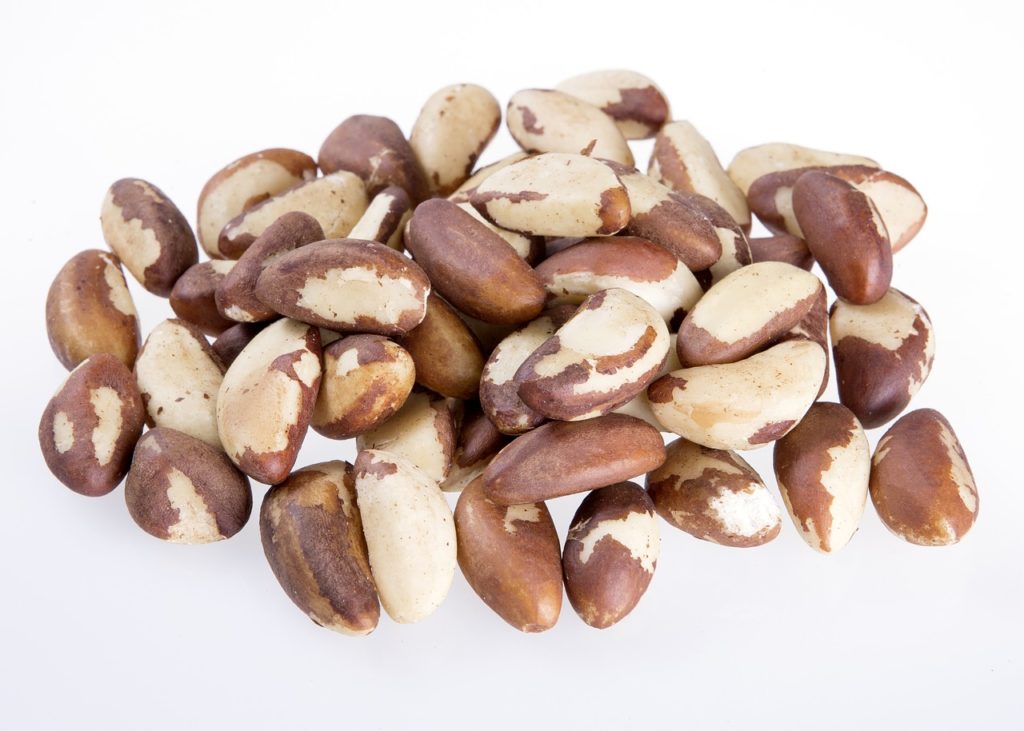I often get asked which nutrients are best to help support healthy thyroid function so I have compiled a list of the most common ones I use in my clinic. As always, this list is not exhaustive and the individual person always needs to be taken into account.
Selenium
The nutrient selenium is crucial for thyroid health (and overall health in general!). An easy way to make sure you are getting enough selenium is to consume a handful of Brazil nuts each day as these are the highest food source of selenium. Both those with under active and over active thyroid can benefit from consuming selenium. Not only is it a powerful antioxidant, it is required for normal functioning of the immune system and has been shown to have a favourable action in auto-immune thyroid conditions where it helps to rest the immune system.
In clinical studies, selenium supplementation in patients with Hashimotos thyroiditis has been found to reduce thyroid antibodies as well as improve patients well-being. Inadequate dietary selenium is thought to be involved in the pathogenesis of autoimmune thyroiditis by lengthening the duration and exacerbating the severity of the disease.
Iodine
Like selenium, the nutrient iodine is crucial for healthy thyroid function. In NSW, Iodine deficiency has reemerged & in my clinic 95% of the women I test are deficient. The government knows there is a widespread deficiency of iodine in Australia, hence it is now mandatory to fortify all bread (except the organic ones) with iodine. For a lot of people (even if you consume iodised salt) this amount is not enough and they are still deficient.
Many people with Graves Disease (an auto-immune thyroid disorder) think they need to avoid Iodine but this is actually untrue. The right amount of iodine will actually help to restore thyroid function, whether you have Graves or Hashimotos. It is extremely important to test your iodine levels through your naturopath before you supplement with iodine as not everybody is deficient and an excess of iodine much can be detrimental (one size does not fit all, everyone needs different amounts!). You also need to have enough selenium in your body for the iodine to work properly. The best dietary source of iodine is seaweed such as nori or wakame or if you don’t like these foods supplementation may be required.
Iron
Iron deficiency is commonly seen in people with thyroid disease, particularly those with Hashimotos. While insufficient intake from diet plays a part, many people with Hashimotos have low stomach acid due to the condition causing them to have less parietal cells (the cells that secrete hydrochloric acid). Less hydrochloric acid means less absorption of nutrients. Iron deficiency impairs thyroid hormone synthesis by reducing activity of thyroid peroxidase (TPO) an enzyme found in the thyroid gland, which is involved in the manufacture of thyroid. My clients currently get great results with transdermal iron, a form of iron you rub onto your skin.
Zinc
Zinc is a mineral that is required to make your thyroid hormones work properly. Inadequate levels of zinc may result in decreased thyroid hormone levels and decreased resting metabolic rate (which means you burn less energy or calories). Supplementation with zinc has been shown to improve thyroid function, particularly levels of the thyroid hormone T3 which is our active thyroid hormone. Sunflower seeds, pumpkin seeds & meat are all good sources of zinc. You might like to make your own trail mix with sunflower seeds and pumpkin seeds to increase your dietary content of zinc.
Vitamin D
Vitamin D deficiency has been demonstrated in those with auto immune thyroid disease and is associated with antithyroid antibody presence, abnormal thyroid function, increased thyroid volume, increased TSH levels and adverse pregnancy outcomes. Impaired vitamin D signaling has also been reported to encourage the growth of thyroid tumours. Even though it is called a vitamin, researchers have discovered that vitamin D actually functions more like a hormone in the body.
The best source of vitamin D is of course sunshine! For maintenance of vitamin D levels experts suggest at least 5-15 minutes of sunlight 4-6 times a week outside the hours of 10 am-2 pm but if your levels are low then you will most certainly need more sun exposure or a supplement.
Confused about what to eat? For a tailor made dietary plan to improve your thyroid health, contact me on lisa.beinbalance@gmail.com




